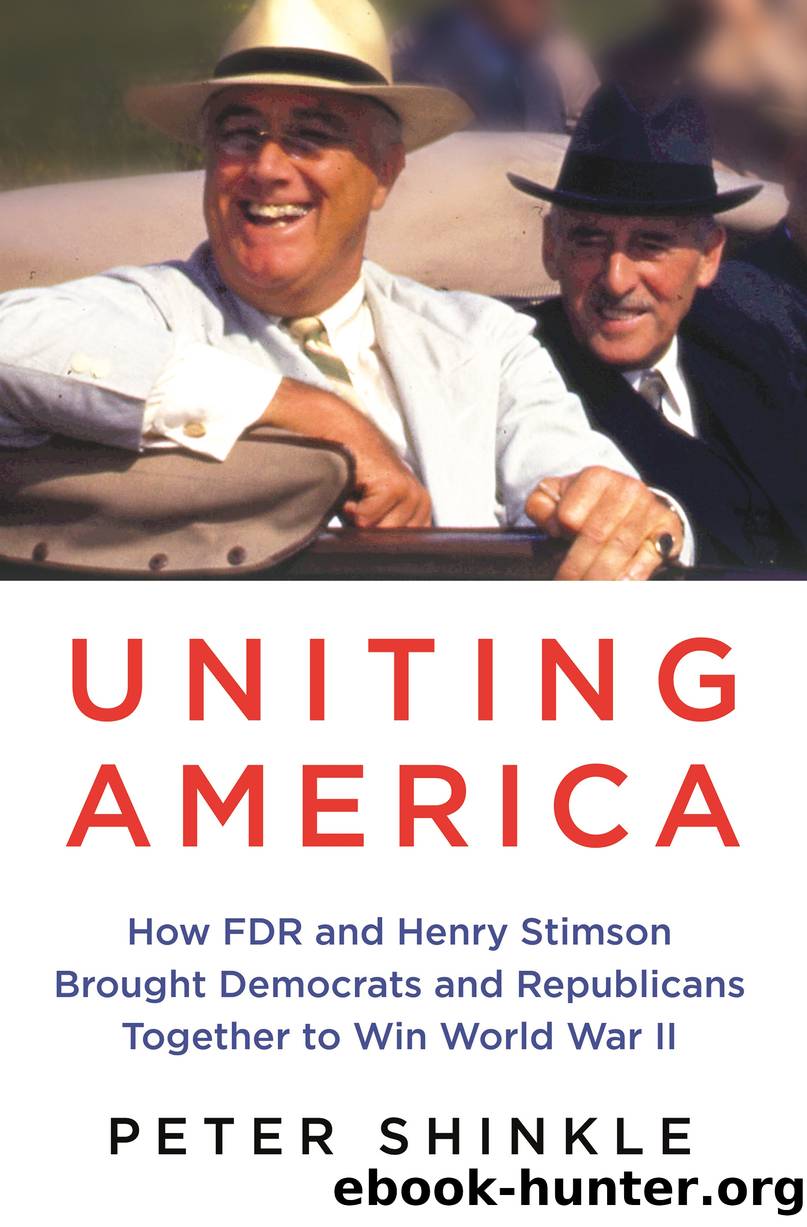Uniting America by Peter Shinkle

Author:Peter Shinkle
Language: eng
Format: epub
Publisher: St. Martin's Publishing Group
* * *
WILLKIE WENT TO the White House for a private meeting on October 14 with the president. Afterwards, seeking again to underscore his independence from FDR, the Republican leader said of the trip, âThis was my own idea. Nobody asked me to do it.â33 He also made a statement saying that the first purpose of the journey was to âdemonstrate to our Allies and to a good many neutral countries that there is unity in the United States on the purpose of winning this war.â
FDR told reporters two days later only that the two men had had âan exceedingly successful and a very interesting talk.â34 He had to tread lightly on the subject of liberating colonies to avoid irritating Churchill. Ever the strategist, however, the president by his silence quietly endorsed Willkieâs anti-colonialist proclamations. Just as FDR benefitted from Stimsonâs aggressive stances on matters such as the Neutrality Act or starting military conscription, the president now gained from Willkieâs ardent appeals for liberation for colonized peoples.
On October 26, Willkie discussed his globe-trotting trip in what he called his âReport to the People,â a radio broadcast heard by a vast audience estimated at thirty-six million Americans.35 Once again, he called for opening a second front and sending more arms to the Allies. Railing against imperialism, he painted the Atlantic Charter as an agreement that promised self-determination for the nations of the Atlantic but turned a blind eye to colonies within the Pacific region. âIs there to be no charter of freedom for the billions of the East? Is freedom supposed to be priceless for the white man, or for the Western World, but of no account to [people] in the East?â He also denounced US policy toward India. âThey cannot ascertain from our governmentâs wishy-washy attitude toward the problem of India what we are likely to feel at the end of the war about all the other hundreds of millions of Eastern peoples. They cannot tell from our vague and vacillating talk whether or not we really do stand for freedom.⦠I can assure you that the rule of the people by other people is not freedom, and is not what we must fight to preserve.â36
William Allen White, the Kansas editor and internationalist Republican, swiftly applauded Willkie for challenging FDR and Churchill. âFor the first time in human history, a major leader of a great republic spoke out specifically, naming names of nations and races, and demanding in terms definite and certain, freedom for all mankind. Mr. Roosevelt and the Atlantic Charter and Mr. Churchill have spoken of freedom but apparently with crossed fingers for Asia and Africa. The Atlantic charter did not interest âthe yellow and brown and the black,â but Mr. Willkie demanded the end of the colonial system. And he looked square at the remains of the British empire as he said âthe end of the colonial system.â His demand was a forward step in the battle for freedom.â37 The speech also drew support from Clare Boothe
Download
This site does not store any files on its server. We only index and link to content provided by other sites. Please contact the content providers to delete copyright contents if any and email us, we'll remove relevant links or contents immediately.
Machine Learning at Scale with H2O by Gregory Keys | David Whiting(4307)
Never by Ken Follett(3945)
Harry Potter and the Goblet Of Fire by J.K. Rowling(3851)
Unfinished: A Memoir by Priyanka Chopra Jonas(3386)
Fairy Tale by Stephen King(3379)
The Man Who Died Twice by Richard Osman(3077)
Will by Will Smith(2917)
Rationality by Steven Pinker(2358)
It Starts With Us (It Ends with Us #2) by Colleen Hoover(2357)
Can't Hurt Me: Master Your Mind and Defy the Odds - Clean Edition by David Goggins(2330)
The Dark Hours by Michael Connelly(2305)
The Storyteller by Dave Grohl(2232)
Friends, Lovers, and the Big Terrible Thing by Matthew Perry(2224)
The Dawn of Everything: A New History of Humanity by David Graeber & David Wengrow(2201)
The Becoming by Nora Roberts(2191)
The Stranger in the Lifeboat by Mitch Albom(2118)
Cloud Cuckoo Land by Anthony Doerr(2108)
Love on the Brain by Ali Hazelwood(2064)
Einstein: His Life and Universe by Walter Isaacson(2015)
